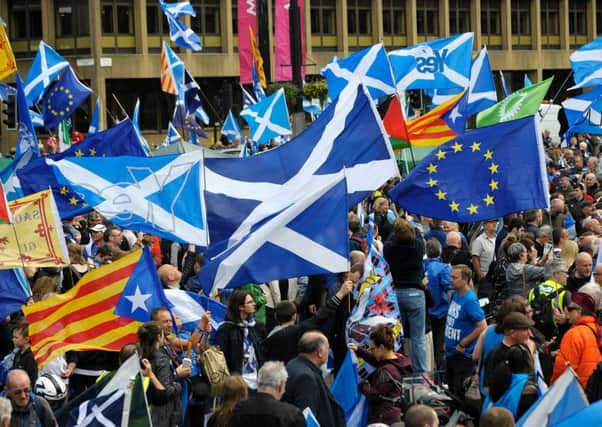Stuart MacLennan: Hurdles too high for EU wild goose chase


On the face of it the First Minister’s pursuit of European Economic Area (EEA) membership for Scotland therefore makes perfect sense – she’s fighting for what Scotland voted for. However, the objective sought – membership of the EEA without independence – is all-but impossible to achieve.
There are three major hurdles. The first is international law. Scotland is not a sovereign state – it has no legal personality, and consequently cannot enter into treaties with other countries. While it in some federal states regions can sign treaties, their capacity to do so is derived from the federal government, and in very limited circumstances. The EU/EEA is the most advanced international organisation in the world – there is no non-independent region on the planet (save, possibly, for the Emirates) with the powers that would be necessary to participate in something like the EEA.
Advertisement
Hide AdAdvertisement
Hide AdThe second hurdle is domestic, and significant. Since early case law it has been clear that single market rules rank above all other forms of domestic law. While this poses no problem where Scotland’s devolved competencies are concerned, it’s not clear what would happen should EEA rules come into conflict with powers reserved to Westminster. One solution might be to devolve all powers necessary for Scotland’s participation in the single market – the trouble is that’s basically all the powers: full fiscal autonomy; regulation of all markets; immigration; competition; employment law; product standards – to name but a few. Were this to happen, there would be little left of the United Kingdom. Scotland would be, de facto, independent.
The third problem is based on EU/EEA law, and is possibly even more challenging. The EU/EEA’s institutions are designed for independent sovereign states. There is no provision for the participation of a non-sovereign territory. Two years ago, the worst-case scenario was that Scotland would have to follow the EU’s accession procedures set out in the treaties. However, compared to what would be required for a non-independent Scotland to join the EEA, the accession process looks like a breeze. Substantial changes to the EU/EEA treaties would be necessary to accommodate a non-sovereign Scotland. Even if Scotland could persuade the EU institutions to go along with this, Scotland comes up against the same brick wall as it would have done post-independence: states with their own secessionist movements such as Spain and Belgium. If Scotland gets to participate in the EEA without independence, Catalonia, the Basque Country, Flanders, and Wallonia (for starters) will want the same.
Wallonia wreaked havoc upon the most recent EU summit because the Belgian Constitution empowered the region to prevent Belgium from signing the Comprehensive Economic and Trade Agreement (CETA) with Canada. It’s doubtful that Brussels will be keen to empower even more troublemaking regions.
Which poses the question: why is the Scottish Government presenting this idea as credible? There is always the possibility that the government is quite happy to build up the hopes of Scottish voters that this is a serious prospect, knowing full well that those hopes will be dashed.
From a nationalist perspective, it makes good practical sense to march supporters to the top of the EEA hill, only for big, bad Westminster to march them back down again. But for the Scottish Government to present itself as pursuing a policy it must surely know has no chance of success is fundamentally dishonest.
It maybe that the First Minister’s true objective is not, in fact, to deliver what the Scottish people voted for in July 2016, but what the Scottish people voted against in September 2014.
Dr Stuart MacLennan is Lecturer in Law at Coventry University